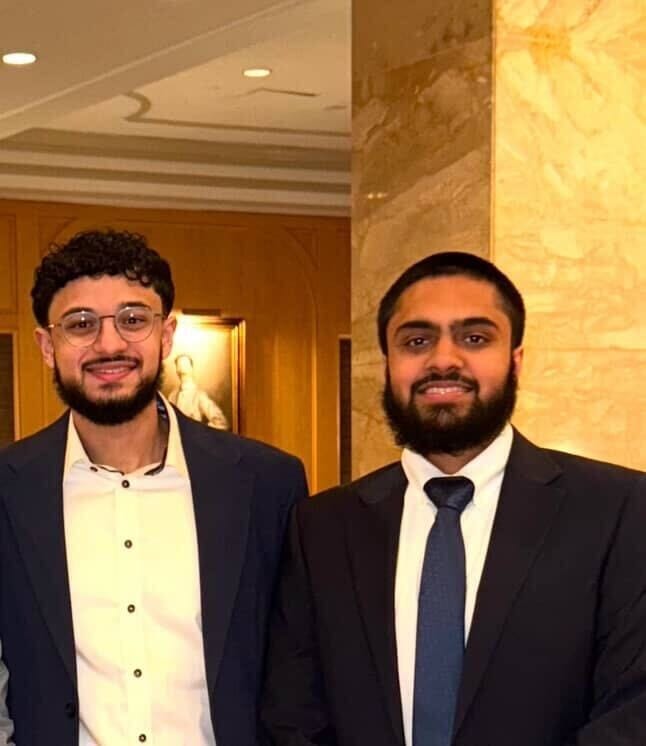Qawl: How two friends want to reshape the digital Quran space
The two childhood friends push for an 'all-in-one' Quran streaming app
Popular Quran applications like Quran Pro and Quran Majeed are among the most widely used by Muslims who listen to iconic reciters such as Egypt’s Sheikh Abdul Basit Abdul Samad and Saudi Arabia’s Sheikh Maher Al-Muaiqly.
Join Islamic for thoughtful stories exploring faith, culture, and the Muslim world.
But while these famous voices shaped how millions experience the Quran, two Muslim students from western Maryland wanted to create space for lesser-known reciters.
In 2021, high school classmates Ali Zia and Musa Waseem came up with the idea for Qawl, a Quran streaming appl designed to highlight new voices.
“Qawl is essentially a Quran streaming app where you can upload your own recitations,” said Zia, cofounder of Qawl. “It’s not only for listening, but for interaction. That’s the biggest difference from other services.”
Most Quran apps feature only a handful of world-famous reciters. Qawl, by contrast, puts content in the hands of its users. “The users actually make the content,” Zia said. “It prevents one style or one background of reciter from being the only one you see.”
The idea began in a Spanish class when Waseem, a hafidh — someone who memorized the entire Quran — often prepared for mosque recitations. Zia said that inspired him.
“During that time, I was just with Musa all the time, watching him prepare for Taraweeh prayers,” Ali recalled. “Musa was kind of my link back to the masjid growing up.”
Waseem, who became a hafidh at 11, explained that around the same time, he realized that many young reciters like him were not getting much attention on social media. They would post clips of their Quran recitations but not get much reach compared to world-renown reciters.
“I realized that the massive talent in reciters we have in the West through social media, but these recitations were scattered and I saw them lacking a platform to share that talent,” Waseem recalled. “This motivated us to create Qawl.”
Both shared an interest in coding and started sketching designs for a Quran app. But college separated them, delaying the project until 2023. That year, they secured a small grant from the University of Maryland’s entrepreneurship program and began development, according to Zia.
Qawl launched on Apple and Samsung app stores in 2024, Zia explained. By September 2025, it had about 750 users and was steadily growing.
Zia and Waseem saw their app as more than just a place to upload audio. They want it to act like a “Vice News for Quran” — a platform for recitations, classes and even competitions.
“We wanted a very digestible way for people to understand what the Quran is beyond surface level,” Zia said.
Their top priority, however, is giving overlooked reciters a voice. Zia pointed to Francophone West Africa, where there are many hufadh, or Quran memorizers, but little media attention. Indonesia, home to countless Quran competitions, faces the same problem, he said.
“Musa would listen to a lot of new reciters on SoundCloud,” Zia said. “But there’s no search engine optimization for the Quran. You could be listening to a recitation and then suddenly get hip-hop remixes.”
The hope is that Qawl will spotlight hidden talent. “We want to give a kid somewhere in the world who’s really good at Quran recitation, but isn’t noticed, the chance to upload, gain a reputation and maybe even fund his education,” Zia said.
“I see Qawl being a platform where Muslims of every age, race and demographic can learn about the Quranic sciences,” Waseem added.
Qawl functions similarly to YouTube. Reciters can record and upload content after completing a Tajweed exam, which ensures proper pronunciation of the Quran.
Zia said they also hope to integrate Quran instructors who can teach Quran and Arabic virtually through the app.
“We just wanted a simple, digital way for people to share their recitation,” Zia said. “Whether it’s passion, practice or publishing high-quality recordings, Qawl is a space made for that.”


